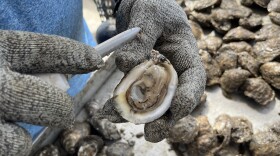
Carlyle Calhoun
Executive Podcast ProducerCarlyle Calhoun is the managing producer of Sea Change.
Before joining WWNO, she produced environmental documentary films and audio documentaries. Carlyle began her career as a newspaper photographer at the Jackson Hole News & Guide and the Wilmington Star-News and later as a freelance photographer based in Croatia and Bosnia. Her work has been featured in publications including The New York Times, The Washington Post and National Geographic Adventure, and in films screened at festivals across the country.
A North Carolina native, she is happy to call New Orleans home. You can find her searching out the best local seafood, hanging by the bayou or riding her bike around town. You can reach her at carlyle@wwno.org.
-
Oil and gas canals. You’ve likely heard about the canals—tens of thousands of them, ever-widening, shredding the wetlands. The canals are what some scientists say is Louisiana’s major cause of land loss. In Part 3 of our collaboration with Wetlands Radio, we explore the impact of canals, why industry has gotten away with the damage, and what's being done about it now.
-
In Part 2, we will discuss building land, a vital part of coastal restoration, and often a highly controversial one. We delve into the thorny politics of human-led land-building projects, but first, we examine how the river builds land when left to its own devices. A process many are trying to imitate.
-
Louisiana is a world leader in coastal restoration. Many would even say number one. The media is full of stories about the coastal land loss crisis in Louisiana, the dire predictions of climate change and sea level rise, and polarizing accounts of controversial projects, but what is also true is that Louisiana is making tremendous strides in piecing this ragged shoreline back together little by little.
-
The amazing science behind understanding mysterious but critical ocean currents. And specifically, understanding the current in our backyard, the Gulf’s Loop Current.
-
The Gulf is one of the LAST places in the world where there is still a major wild oyster harvest. Lately, though, that harvest…is in trouble. In this episode, we ask: What can the oyster's downfall and resurrection tell us about a future of farming the ocean?
-
Part 1 of a 2-part series exploring the future of farming seafood in the Gulf. There’s a growing global movement to farm more and more of our seafood. Currently, proposals are being considered to establish massive fish farms in U.S. federal waters. The most likely first home to these new farms is the Gulf.
-
The smallest and most endangered of sea turtles, the Kemp's Ridleys, have returned to Louisiana's Chandeleur Islands after 75 years.
-
What does it take to stay rooted on the Gulf Coast, even as the land and weather change around us? We meet individuals, from a poet to a minister to a computer programmer, each finding their own creative ways to adapt and fight for the future of their communities.
-
There was a time back in the 1980s when overfishing had decimated popular fish like red snapper and grouper in the Gulf. Today, we hear the remarkable success story of how unlikely partners joined forces to save an industry and an ecosystem through a controversial program called catch shares.
-
Today, we’re bringing you a wild story. It’s about a covert ocean adventure from back in the Cold War days that inadvertently set off a brand new industry. And it’s an industry that’s been in the news a lot lately: deep-sea mining.











